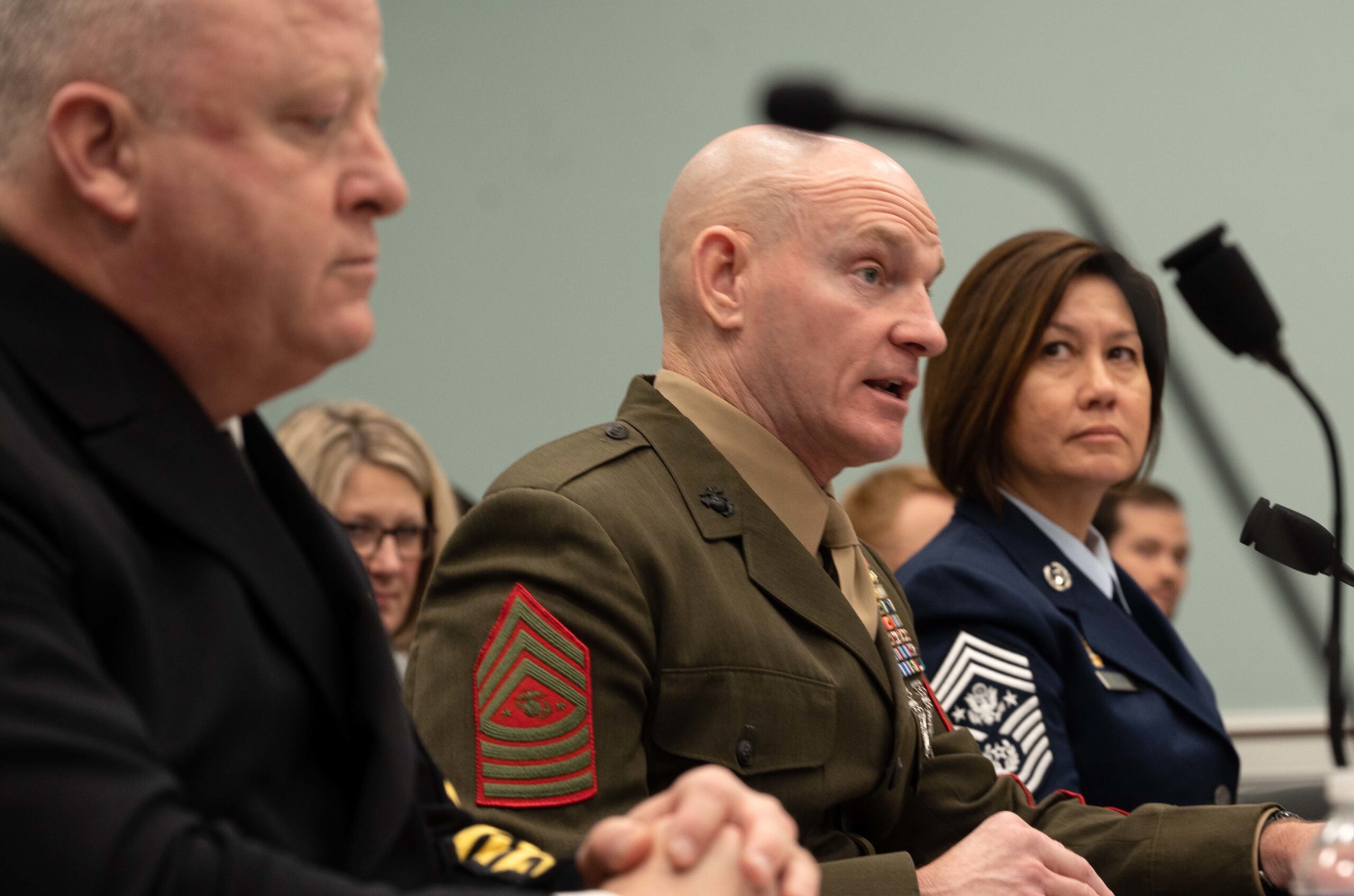

Sergeant Major of the Army Michael Weimer said that as a former “Army brat,” he remembers growing up in a pre-9/11 world where military installations didn’t have gates and fences separating them from the outside world.
“We shut ourselves in for all the right reasons, and there’s still reasons to maintain some of that,” Weimer said. “It really changed the dynamics.”
But Wiemer was one of six senior military leaders who told Congress Wednesday that quality of life issues as well as recruiting efforts could improve by bridging that gap between military bases and local communities.
The top enlisted leaders of all five active duty branches testified to the House Armed Services Committee’s Quality of Life panel about pay, child care, and spouse employment and its effect on retaining active duty troops, and recruiting. The panel included the top enlisted troops from the Army, Marine Corps, Navy, Air Force and Space Force and Troy Black, who was recently installed as the Senior Enlisted Advisor to the Chairman, or SEAC, the Pentagon’s most senior enlisted role.
The senior enlisted leaders told members of the House Panel, who craft budgets for the armed forces, that the military needs to take lessons from the civilian world in its approach to quality of life issues like competitive pay for specialized jobs and broader childcare options.
Community
Several of the senior advisors said they had recently visited Fort Bliss where they’d found a strong relationship between the Army base and the El Paso community.
“I’m relatively sure that if you are in El Paso, you’re very familiar with what’s going on on Fort Bliss,” said Black. “That connection between community and the base or the installation is huge because that will increase understanding and knowledge of what goes on within our U.S. military writ large.”
Weimer commended the Fort Bliss garrison leadership and said the service’s need to grow the strong base-community relationship model. One of the successful collaborations Weimer highlighted was the agreements with off-base Child Development Centers for increased childcare access.
“At Fort Bliss, there are five different CDCs, their average wait time was three to five days which is pretty remarkable,” Weimer said.
Chief Master Sergeant of the Air Force Joanne Bass noted that childcare access problems across the country are also impacting the military.
“The childcare issue is not one that the military is going to be able to get out and get after by itself. We are going to need our communities outside the fence line to help us,” Bass said.
Rep. Jen Kiggans (R-Virginia) also recommended that the branches look at adding childcare options at military gyms – a service that already exists in many private gyms.
Pay Parity
Officials testified that pay needs to mirror the private sector but should be commensurate with the expectations for certain jobs and responsibilities in the military.
Chief Master Sergeant of the Space Force John F. Bentivegna said that it’s getting harder to compete with the private sector to retain troops with specialized skills that the military has funded to train.
“If you’re an enlisted service member and work in cyber,” he said, “That individual can practice within authorities that no civilian, or the PhD and many zeros after their paycheck can ever execute. How do you reward that? And what’s the attraction to stay other than pride of service and to your nation?”
Recruiting
The enlisted chiefs also tied recent recruiting misses to better connections to local communities.
Black said that “nationwide engagement” across the federal government, private media, sports and entertainment industries and public education institutions would “increase the desire to serve” and widen the pool of candidates that can meet the recruiting requirements.
The Navy recently announced it would allow recruits to join without a high school diploma or GED.
It also goes both ways. In order for the military to attract more talent, its policies need to reflect American society, said Master Chief Petty Officer of the Navy, James Honea.
Honea noted that the study that launched the all-volunteer military, the 1970 Gates Commission, found that quality of life was one of the five pillars for the U.S. to sustain a force without a draft. Quality military pay, health care, housing, retirement plans are supposed to ensure “the military remains a reflection of our society,” he said.
“The American people need to trust that we have the best interest of their sons and daughters in mind and that they will be taken care of while serving their country,” he said.
Softball questions
Previous public hearings by the House Armed Services Committee’s Quality of Life Panel heavily focused on housing, a damning Government Accountability Office report, and soldier’s experiences with moldy and unsafe barracks. Wednesday’s hearing shied away from those topics, which didn’t please everyone. A chorus of vets and military advocates who watched the hearing said it was full of softball questions and lacked solutions from the services going forward.
“I wanted a bit more from todays hearing on QOL from the @HASCRepublicans panel,” said Robert Evans, creator of the Hots&Cots app, which has chronicled troops’ struggles with moldy and outdated barracks. “I felt like there was no hard pressing questions asked and no clear plan on resolving some of these QOL issues.”